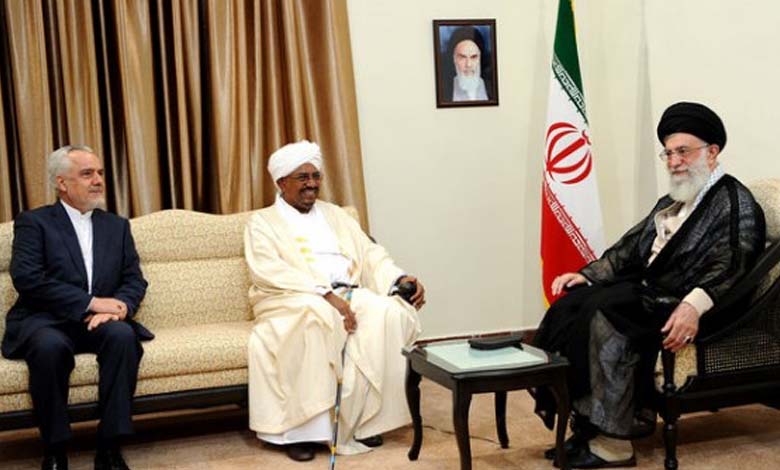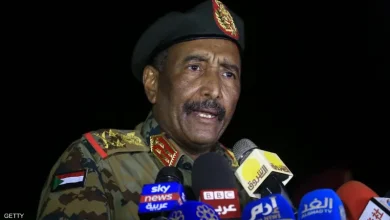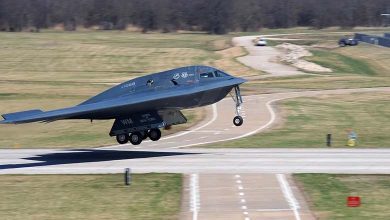Iran and Sudan: Mysterious Ambitions and Investments in Crises

The Iranian-Sudanese relations, which were resumed on October 10, 2023, witnessed a fluctuating history after a seven-year hiatus decided by Khartoum following the crisis of the Saudi embassy’s invasion in Iran in 2016.
With the escalation of conflicts and outbreaks of wars and crises in the region, Tehran and Sudan resumed diplomatic relations last October. The Sudanese Ministry of Foreign Affairs stated that “the two governments agreed to develop friendly relations based on mutual respect, equality, common interests, and peaceful coexistence.”
The two sides also agreed to expand cooperation in various fields to achieve the interests of the two countries’ peoples and serve the security and stability of the region. Additionally, they agreed to take steps to soon open the embassies of both countries and arrange for the exchange of official delegations.
A Renewed Relationship
After the restoration of diplomatic relations between Tehran and Khartoum, Iran decided to support the Sudanese army led by Abdel Fattah al-Burhan in its military conflict against the Rapid Support Forces led by Mohammed Hamdan Dagalo “Hemetti” and provided it with military equipment, including “Mohajer 6” drones.
Iran’s Interest in the Red Sea
In this context, Mohammed Khairy, a researcher in political philosophy, stated that the restoration of diplomatic relations between Sudan and Iran opened the door for Tehran to request from Sudan access to the Red Sea by establishing a naval military base on Sudanese territory overlooking the Red Sea. He noted that the Iranian request was met with rejection as Sudan realized there was a hidden agenda behind Tehran’s interest in being present in the Red Sea.
Investing in Crises
Khairy added that the current complex situation in the Red Sea is the result of one of Iran’s tentacles in the region, wondering, “What if Iran were present directly through its navy or the Revolutionary Guards in the Red Sea?”
Khairy emphasized that as long as Iran seeks to be present through Sudan, it is well aware that Iran is fishing in troubled waters by investing in the crises of countries.
Suspicious Moves
He pointed out that Iran relied on its military support to the Sudanese army by providing it with suicide drones, as it did with Russia, to ensure positive responses from the Sudanese side if it requested to be officially present in the Red Sea and threatened navigation from time to time due to its base in the region.
Khairy stressed the necessity for the Sudanese army and officials to be aware of Iran’s role in the region and the shape of Iranian movements, which are causing major crises at all levels. Therefore, it is imperative to contain Iranian influence in the Middle East.
On his part, Mohamed Rabie Al-Badihi, a researcher at the Dialogue Center for Political and Media Studies, confirmed that the relationship between Iran and Sudan was close under the rule of the Sudanese Islamic Movement led by Al-Turabi and President al-Bashir since 1989. This relationship persisted until January 2016 when it was publicly interrupted due to the attack on the Saudi embassy in Tehran. With the normalization between Riyadh and Tehran, these tensions eased, and relations between Iran and Sudan were resumed.
Western Concerns
Al-Badihi pointed out that the resumption of relations between Iran and Sudan increases Western and American concerns, especially with the escalating activities carried out by Iran’s proxies in the region towards the West and the state of Israeli occupation, such as the operations conducted by the Houthis in the Red Sea. This implies strengthening American military presence in the region, including in the Red Sea, especially after the targeting of ships bound for the occupying state by the Houthi group in Yemen’s Bab el-Mandeb strait.
Establishing Iranian Military Influence in Sudan
Al-Badihi clarified that establishing Iranian military influence in Sudan is followed by expanding Iranian influence to the coasts of the Red Sea. This could provide Iran with a foothold through Sudanese ports on the strategically important commercial route for Egypt, Saudi Arabia, and Jordan, in addition to achieving Iran’s long-standing goal of gaining a permanent foothold on the coasts of the Red Sea and the Horn of Africa.
Iranian Presence in the Middle East
One of the repercussions of Iranian presence in Sudan may include deepening relations with the African Union and Tehran, especially after Saudi Arabia, Egypt, Sudan, Morocco, and Nigeria pressured African Union countries to sever ties with Iran following the attack on the Saudi embassy in Tehran.
Additionally, Al-Badihi explained that the Sudanese army could benefit from relations with Tehran by receiving military equipment from Iran, which affects and helps the military institution endure longer in the war and drain the opponent. Iran may also seek to regain its strong presence in Sudan and the region extending along the eastern coast of Africa, where recent rapprochement with Sudan helps Tehran to reposition itself in the East Africa region.
A Mysterious History of Relations
Over the past five decades, Iranian-Sudanese relations have experienced various tensions, notably Sudan’s support for Iraq during its war against Iran (1980-1988). Afterwards, former Sudanese President Jaafar Nimeiri accused Iran in 1985 of arming the Muslim Brotherhood to oppose his rule, the same year he was ousted in a popular uprising.
After Field Marshal Abdel Rahman Swar al-Dahab took power in Sudan, bilateral relations witnessed high-level activity, leading to a transitional period in Sudan followed by the rule of Islamic groups loyal to Iran.
In 1989, Omar al-Bashir seized power in a military coup and sought to strengthen his relations with Tehran. At that time, Iran supplied weapons to al-Bashir‘s regime, which was involved in internal wars during the 1990s. The Iranian Revolutionary Guard also played important roles in Sudan during that period. In January 2016, Iranian protesters stormed the Saudi embassy in Tehran, prompting Sudan to announce the diplomatic severance with Tehran.
According to the American “Bloomberg” agency, Iran has ambitions to impose its control over the Red Sea through the Sudanese coast, which stretches 800 km.












